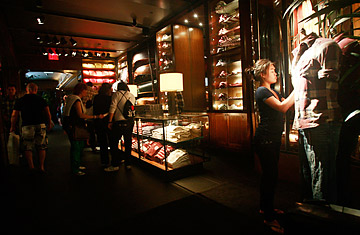
Abercrombie & Fitch's flagship store in New York City
What might be the driving factor that lowers holiday retail sales and stalls a much-anticipated economic recovery? Stingy spouses with children. According to a new survey from America's Research Group, a retail-consulting firm, 50.1% of parents plan on cutting back on gifts to each other this year. That figure is up from 44.4% last year, a surprising jump considering that the U.S. was in the depths of the financial crisis during the previous holiday season. "Parents want to maintain gift-spending levels for their kids, so they are showing more willingness to trim on each other," says Britt Beemer, founder and chairman of America's Research Group.
In 2007, only 6% of spouses said they would cut back on gifts for each other, so in just two years the number of spendthrift spouses has increased almost nine-fold. "This holiday season, parents are telling us that they still worry about job security, and they are desperately trying to cut down on debts," says Beemer. Even the pooch may be getting better treatment than Pops. In a separate Consumer Reports survey, 22% of women who expected to reduce their holiday spending said they would be cutting back on gifts for their spouse. Only 14% said they would cut back on gifts for their pets. Ruff.
Thanks in part to these forecasted cuts in spouse-to-spouse gifting, Beemer is predicting a 2.9% drop in holiday retail sales, compared with a 2.7% drop a year ago. "I know some analysts are predicting positive numbers, but I just don't see it working out as well," he says. Given his track record — Beemer's sales predictions have been accurate within a half of 1% over the past 17 of 18 holiday seasons — the economy shouldn't expect a Christmas gift. "It's a heck of a challenging time," says Mark Israel, president of Hearts on Fire, a high-end jewelry maker, "and we have to respond." Israel says Hearts on Fire will sell more products than usual below the $3,000 price point.
According to Beemer's research, 51.5% of consumers plan to spend less this year, compared with 40.1% who said they'd cut back a year ago. Retailers have been quick to trumpet how their more manageable inventory levels and smaller staffs will help control costs. But such cuts could backfire against them. Over 41% of shoppers, as opposed to 21% in 2008, say they will leave stores that are short-handed or have long lines at the register. If cash-strapped customers already feel a little guilty about shopping to begin with, they'll look for any excuse to head home.
Of course, attractive deals can always trump fiscal responsibility. And plenty of retailers are offering incentives for husbands and wives to stuff each other's stockings. "In general, retailers realize that shoppers don't have as much money," says John Vincent, founder of BlackFriday.info. "They know you're not going to spend $1,000 on a TV. So they are emphasizing deals for smaller, more practical, more giftable items." Vincent points to Target, which on Black Friday will be selling $3 coffeemakers, toasters and sandwichmakers. Not exactly stuff that tugs at the heartstrings on Christmas morning, but hey, it's the thought that counts (and if the toast is crispy, even better). In its Black Friday circular, Kohl's blankets shoppers with 50%-60% discounts for watches and jewelry. Some items are priced as low as $9.99.
You can also find a flurry of deals for both husbands and wives online. On the discount site Couponcabin.com, Ann Taylor is offering $50 off any $150-or-higher Web purchase through Jan. 5. You can get free shipping for Hammacher Schlemmer products over $89. Then there are the gifts that both Mom and Dad can enjoy. Restaurant.com, for example, is offering 50% gift certificates. Get a babysitter and leave the kids at home. More consumers are searching for deals: on PriceGrabber.com, the number of shoppers requesting e-mail alerts for low-priced offers is up 70%.
Despite the temptation to spend, many spouses are still skipping the gift exchange. Matt Batt, a public relations executive from Chicago, and his wife usually spend about $200 on presents for each other. This year, they're cutting spousal gifts entirely, opting to spend that money on their 19-month-old second child and other family members. "This doesn't mean we love each other any less," says Batt. "We just want to do what's right for the Christmas spirit." Batt's a nice Santa for his son. But for companies that are counting on Dad's splurging on Mom, consumers like Batt are nothing but the Grinch.
